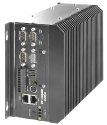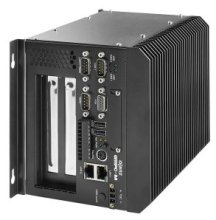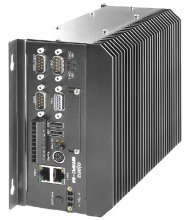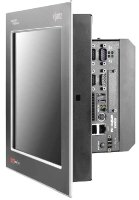Industrial PCs support real-time Linux extensions
Jul 23, 2008 — by Eric Brown — from the LinuxDevices Archive — 21 views German industrial PC vendor Janz Automationssysteme AG is now supporting the RTAI and Xenomai Linux real-time extensions for its latest industrial computers. Systems supporting the real-time extensions include Debian Etch Linux versions of its new emPC-M (pictured at left) and similar display-enabled emView embedded computers.
German industrial PC vendor Janz Automationssysteme AG is now supporting the RTAI and Xenomai Linux real-time extensions for its latest industrial computers. Systems supporting the real-time extensions include Debian Etch Linux versions of its new emPC-M (pictured at left) and similar display-enabled emView embedded computers.
RTAI (real-time application interface), which was rev'd to version 3.0 in 2003, enables the writing of applications with strict timing constraints for hard real-time applications. Now available in version 3.6.1, the RTAI distribution includes the RTAI-Lab toolchain, which is said to convert Matlab-style block diagrams into RTAI executables, and to monitor their operation on various targets.
Xenomai is a real-time add-on for Linux that evolved from RTAI. It provides “skins” for emulating API-requests for different real-time operating systems (RTOSes). Xenomai provides real-time interfaces either to kernel-space modules or to user-space applications. Interfaces include RTOS interfaces (pSOS+, VRTX, VxWorks, and RTAI), standardized interfaces (POSIX, uITRON), or new interfaces designed with the help of RTAI (native interface). Based on Adeos as well as RTAI, Xenomai was launched by Philippe Gerum, the implementor of the Adeos hardware abstraction layer.
In March, a community project announced availability of a new open source version of Xenomai called Xenomai/SOLO. Aimed at increasing Linux's utility in industrial computing, Xenomai/SOLO offers VxWorks and other RTOS emulation in user-space on Linux kernels. It is designed to deliver short, bounded application latency on kernels with built-in real-time capabilities.
Xenomai/SOLO dispenses with its predecessors “co-kernel” approach, in which real-time applications run on a separate kernel that “cooperates” with the Linux kernel. Since Xenomai/SOLO integrates the RTOS emulation layer more tightly with the Linux kernel, developers don't need to worry about configuration mismatches that often occur with a co-kernel, says the group.


emPC-M, with (left) and without (right) dual-PCI slots
(Click any to enlarge)
Janz emPC-M
Janza's emPC-M industrial computers use passively cooled Intel Core Duo, Pentium, Celeron, or AMD Geode LX800 CPUs. In addition to supporting Debian Etch 4.0 Linux with real-time extensions, they support Windows 2000, XP, and CE. The emPC-M offers an IEC 61131-3 Soft PLC option for industrial control, as well as optional support for the CoDeSys automation programming system, says Janz.
 EmView, the display-enabled version of the emPC-M (Click to enlarge) |
The top-of-the-line emPC-MCD system is equipped with an Intel Core Duo clocked to 1.66GHz, with 2MB cache and 2GB DDR2 RAM, says Janz. The emPC-MCD can accept up to 4GB of flash memory via an external CompactFlash socket and an optional internal CF socket. It can also be stocked with an internal 2.5-inch hard disk drive. For connectivity, the emPC-MCD provides dual CAN/CANopen interfaces, dual 10/100 Ethernet ports, two USB 2.0 ports, and a serial port. The computer is equipped with a VGA connector and supports resolutions up to 1280 x 1024.
The 2.8 x 6.3 x 9-inch (71 x 160 x 230 mm) computer can support operating temperatures that range from 32 to 122 degrees F (0 to 50 degrees C), says the company. The emPC-M includes a proprietary slot for additional I/O module options, and there's a larger model with dual PCI expansion slots (see photos above).
emPC-M systems can be mounted on the back of a display as an HMI system, with or without touchscreen capability. The Janz emView systems are offered as preconfigured panel/emPC-M combinations. A variety of emView systems are available with 12- and 15-inch displays, and additional models, including 10.4- and 19-inch displays will be available by the end of the year, says Janz.
Availability
The Janz emPC-M equipped with the RTAI/Xenomai real-time Linux extensions appears to be available today in a variety of configurations, and emView display-panel versions are also available, with more models arriving by the end of the year. More information on the emPC-M may be found here, and U.S. customers are encouraged to visit the company's U.S. representative, Saelig Co..
This article was originally published on LinuxDevices.com and has been donated to the open source community by QuinStreet Inc. Please visit LinuxToday.com for up-to-date news and articles about Linux and open source.